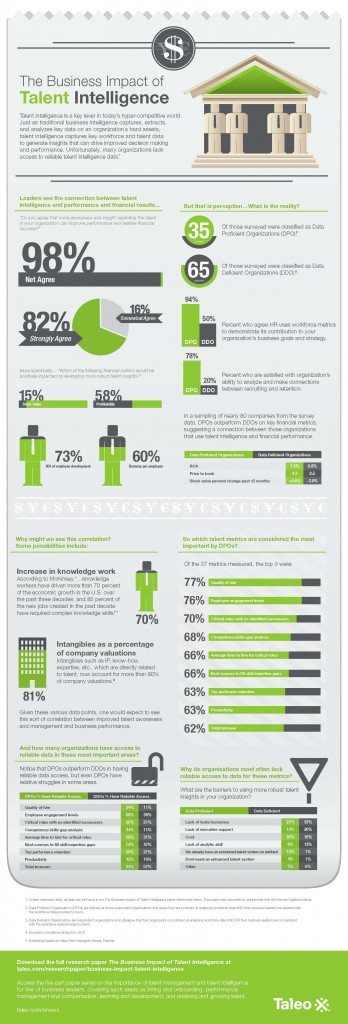The digitized workplace is like a giant data buffet. Applications, chat platforms, social networks, email – it creates an endless smorgasbord of talent-related information.
HR may be hungry for it all, but successful companies are especially good at digesting it.
So says a new study from Taleo Research and the Human Capital Institute titled The Business Impact of Talent Intelligence. Based on surveys of more than 600 global organizations, the report shows how companies that make strategic use of workforce data also happen to do a great job of satisfying the demands of their management.
The secret formula for competitive advantage
The key is to deliver that data in a way that lets managers make more informed decisions about talent – and make those decisions sooner. Insights like these help companies build their Talent Intelligence. And because the company with the best talent wins, improving Talent Intelligence is fast becoming the secret formula for seizing competitive advantage.
Not surprisingly, some companies are better than others at using workforce data. The report distinguishes between data proficient organizations (those that are adept at using talent data) and the data deficient (those that aren’t). Just 35 percent of respondents were classified as data proficient, and nearly half indicate their management is dissatisfied with the workforce data they provide them.
 Respondents from data proficient companies paint a far more positive picture: Management is much more satisfied with their workplace data. They’re also better at drawing connections between retention and recruiting, and at calculating HR’s impact on business strategy.
Respondents from data proficient companies paint a far more positive picture: Management is much more satisfied with their workplace data. They’re also better at drawing connections between retention and recruiting, and at calculating HR’s impact on business strategy.
Some other findings:
- Leaders require Talent Intelligence that’s accurate, insightful, and actionable. More than 75 percent of data proficient companies are successfully addressing the workforce data needs of their businesses. Among the data deficient, it’s just 39 percent.
- Improved Talent Intelligence helps businesses win in the marketplace. The data proficient are more likely to outperform the data deficient. There is a correlation between Talent Intelligence and financial metrics such as return on assets, relative stock market performance, and market-to-book ratios. This makes sense given how important knowledge workers are to economic growth and the growing need for employees to possess complex knowledge skills.
- The real barrier to data proficiency isn’t money — it’s a lack of leadership and vision. Data deficient companies struggle to boost their Talent Intelligence because they lack tools, resources – and, crucially, executive support. The findings suggest cost is not a major factor.
- Emphasis on metrics varies with data proficiency. The data proficient tend to value many of the same metrics as data deficient organizations. But they place far higher importance on measuring and tracking internal talent demand, quality of hire, engagement, and fit within the organization.
- Too many companies can’t track key metrics. Many respondents said they don’t have access to reliable data about metrics they view to be important. These include competency/skills gap analysis, cost of turnover, employee engagement, quality of hire, employee productivity, succession planning, learning and development.
- With Baby Boomers now retiring, bench strength is critical. People with decades of experience (many of them in management) will be leaving the workforce at a rate of 10,000 a day, every day, for the next 19 years, yet only 14 percent of data deficient organizations could identify their bench strength.
Most companies surveyed say they use at least some rudimentary form of Talent Intelligence. But Talent Intelligence can involve much more than just tracking the typical “administrative” HR data points. Using advanced techniques, companies gain historical, current, and predictive views of the workforce and its direct impact on business operations.
They measure complex data like quality of hire, competency/skills gaps, and employee engagement. They create accurate and clear profiles of large or dispersed workforces. And they connect HR metrics to enterprise strategy and performance, reaching across functional silos to capture data and provide actionable information to leaders.
The report, available here, bears out that Talent Intelligence is an essential link between HR, business leadership, and the human capital that fuels our knowledge economy. Companies that take advantage of this can gain a strategic advantage. Those that don’t will see lower profits, less innovation, and shrinking market share.
